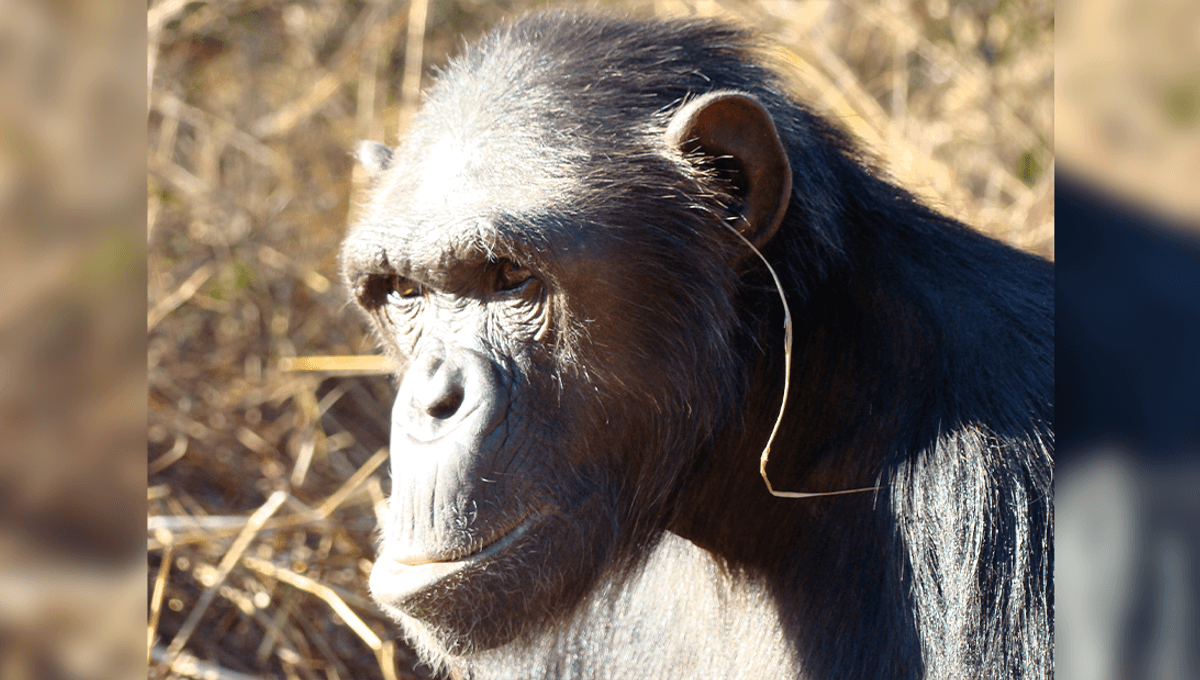
It may be Paris Haute Couture Week, but the French capital isn’t the only place that fashionistas are making waves: In Zambia, a group of avant-garde chimpanzees have been sporting blades of grass protruding from their ears… and rears… It’s called fashion, look it up.
The cutting-edge chimps appear to be doing this for no obvious reason, and the same behavior has not been seen in other groups from the same sanctuary, leaving the researchers to ask: Why?
“This shows that, like humans, other animals also copy seemingly pointless behaviours from one another,” Utrecht University researcher Edwin van Leeuwen said in a statement. “And that, in turn, may offer insights into the evolutionary roots of human culture.”
Usually, when animals copy one another, it serves some sort of purpose. Chimps, for example, learn from each other how to forage for food, select tools, and use plants to treat wounds. But not all mimicked behavior is useful – take the orca dead salmon hat trend, for example. Such futile fads are rarely studied, though they offer us an insight into animal culture that can inform what we know about our own cultural practices.
The grass-in-ear craze was first documented in 2010, when a female chimpanzee named Julie was observed repeatedly inserting grass into her ear at Zambia’s Chimfunshi Wildlife Orphanage Trust sanctuary. Later, the idiosyncratic behavior would be adopted by seven other chimps in the same group, and persisted even after Julie’s death, “suggesting it had become a cultural tradition”, the study authors write.
“Unlike most chimpanzee traditions that involve tool use or foraging, the grass-in-ear behaviour more closely resembled human fashion trends, where the function may be less tangible than in the instrumental context of foraging.”
Fast forward some 15 years, and chimpanzees in another group at the same sanctuary have hopped on the bandwagon, despite having no contact with the original group.
Five out of eight chimps were spotted wearing grass in their ears, while six put their own unique stamp on the trend, letting the blades dangle from their behinds. Neither behavior was seen in any other group in the sanctuary, except for two males in the original grass-in-ear group.
After tracking the animals for some time, the team noticed they were copying the behavior from each other, and may have identified the original trendsetter (plot twist: they’re not a chimp).
“Both groups where chimps put blades of grass in their ears, had the same caretakers. These caretakers reported that they sometimes put a blade of grass or a matchstick in their own ears to clean them,” Van Leeuwen said. “Caretakers in the other groups said they did not do this. The chimps in the one group then figured out to stick the blade of grass in another place as well.”
It’s impressive, especially considering that some scientists have been known to believe humans are unique in our ability to replicate seemingly pointless details. This new research challenges that assumption.
However, the behavior may not be as useless as it seems, Van Leeuwen explained. “It could also serve a social purpose. By copying someone else’s behaviour, you show that you notice and maybe even like that individual. So, it might help strengthen social bonds and create a sense of belonging within the group, just like it does in humans.”
Elsewhere in the primate kingdom, a significantly more concerning trend seems to be taking root among capuchins on an uninhabited island of Panama: abducting baby howler monkeys. I doubt we’ll be seeing either in Vogue any time soon.
The study is published in the journal Behaviour.
Source Link: Chimps Are Sticking Grass In Their Ears And Rears As They Embrace “Pointless” Fad